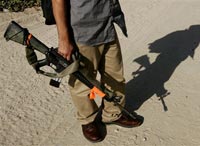Talibs release all Koreans, vow to abduct more foreigners
Taliban militants released the last seven South Koreans hostage by under a deal with the Seoul government.

The seven hostages were handed over Thursday to the International Committee of the Red Cross in two separate exchanges close to the central Afghan city of Ghazni, Red Cross officials and an Associated Press reporter said. The freed hostages did not speak to reporters.
The final three released - two women and a man - were handed over by armed men on a main road in Janda district after apparently walking through the desert for some distance. Covered in dust, they were quickly bundled into a Red Cross vehicle and driven away.
The seven were part of a group of 23 church volunteers who were abducted on July 19 as they traveled by bus along a dangerous road in southern Afghanistan. The militants killed two men soon after taking them, and released two women earlier this month in what they termed a "goodwill" gesture. On Wednesday, the Taliban released the 12 other hostages.
The United Nation's Secretary-General Ban Ki-moon welcomed the release but deplored the continuing abduction and senseless murder of innocent civilians.
Despite the tragic death of two hostages in July, "he is happy that those released are now on their way to being safely reunited with their loved ones," U.N. deputy spokeswoman Marie Okabe said Thursday.
The men accompanying the last hostages freed gave an unsigned note to journalists accusing the South Koreans of coming to Afghanistan on a mission to convert the staunchly Islamic country to Christianity.
"They came to our nation to change our faith," the handwritten note read. "The Afghan people have given their lives for their faith. This is the reason we arrested them."
The South Korean government and relatives of the hostages - all of whom belonged to a Presbyterian church close to Seoul _ have insisted they were not engaged in missionary activities, but were doing aid work such as helping in hospitals.
The identity of the armed men was not clear. The Taliban said earlier they had handed the three hostages to tribal elders who would transfer them to the Red Cross and in Afghanistan, many villagers carry weapons.
The crisis ended under a deal struck Tuesday between Taliban commanders and representatives of the South Korean government, which has been under intense domestic pressure to bring the hostages home safely.
Under the terms of the agreement, Seoul repeated a pledge it had made long before the kidnappings to withdraw its 200 troops in Afghanistan before year's end and vowed to prevent missionaries traveling to the country.
The Taliban apparently backed down from an earlier demand for a prisoner exchange.
In Washington, the State Department welcomed the hostages' release. When asked if South Korea's negotiations with the Taliban set a dangerous precedent, spokesman Tom Casey refrained from directly criticizing the Seoul government.
"I'd simply reiterate that the long-standing U.S. policy is ... not to make concessions to terrorists," he said.
While there was no sign that the militants extracted any other concessions, analysts say the militants emerged from the crisis with renewed political legitimacy because for the first time since their 2001 ouster, they negotiated with a foreign government.
"Taliban now have diplomacy, they have got spokesmen, they value cameras, they have a political dimension for their movement, and their aim is to be recognized as legitimate," said Mustafa Alani, director of security and terrorism studies at the Dubai-based Gulf Research Center.
South Korea has denied doing anything wrong, saying it was not unusual to negotiate with hostage-takers.
The freed hostages were expected to fly back to South Korea by Sunday after health checks.
Subscribe to Pravda.Ru Telegram channel, Facebook, RSS!


